


(D&B Films/Kam Bo Motion Picture Co., Dir. Luk Kam Bo)
Two young women - a thief from the Mainland and the daughter of a couple in debt to a loan shark - are coerced into prostitution by crime boss Cheng Ga. A third prostitute provides assistance to them. Yukari appears halfway through the movie as a Japanese cop investigating Cheng Ga’s drug dealing. She has two fight scenes - one relatively brief at a dock, and an extended punching match at Cheng Ga’s hideout. The three women are recruited to help Yukari, after being brutally abused by Cheng Ga.
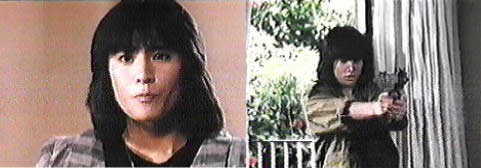
Wearing green, military-style fatigues, Yukari eventually rescues them in one of her best extended fight sequences. She displays exhilarating energy, martial arts skills, and physical resilience during this rooftop battle in which she dispatches, among others Dan Mintz. This movie’s credits are all earned in the last ten minutes.
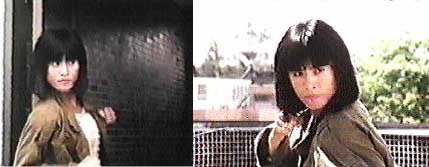
A 2, B 4, C 2, D 2, E 2, F 1.5 (13.5).
Fight Scenes
(Dir. Chik Gei Yee)
“Ying” - played by Yukari - is a police officer and the eldest of three sisters whose detective fiancé - Mark Cheng - appears to be killed in a car explosion during a drug raid on the criminal “Bull.” Her youngest sister “Rabbit” is inspired by witnessing acts of male sexual harassment and violence to use a Christmas party costume as cover for the persona of a masked crime crusader “Cotton Flower.” After beating another woman’s abusive husband she also confronts several petty street criminals, leaving a cotton flower at the scene.
An older police inspector recalls an earlier Cotton Flower case. This had actually been the sisters’ grandfather. Ying’s middle sister “Cherry” is almost killed during a police raid on a mahjong parlor. After briefly re-uniting with her fiancé, who has infiltrated a drug gang while undercover, Ying becomes a suspect in the Cotton Flower case. Chief Yau’s investigation takes the form of a slapstick dating and bedroom farce in an attempt to discover Cotton Flower’s identity. The male police officers appear to assume they can date the female characters at will, and this sequence detracts from the film. Cotton Flower interrupts a guns-for-drugs deal with a flame-thrower, but must be rescued by her older sister Ying. The sisters join forces. Mark Cheng’s character is eventually killed in the course of an attack by Bull’s gang. The slapstick abruptly gives way to a fairly brutal fight in which the three sisters unite to rescue Chief Yau from Bull. This fight is unfortunately poorly lit so that the action is obscured. Despite this it is intense and vicious, with rapid combination kicks. Despite a sub-average plot, Yukari plays her part straight, as always. Favorite line (Yukari): “I must kill you.”
A 2.5, B 4, C 1, D 2.5, E 3, F 1.5
(14.5). Recommended
(New Treasurer Films, Dir. Lau Gok Hiu)
This is a dark, bleak story, with many scenes filmed at night. The production values are better than usual, and there is a strong cast that includes Max Mok, Clare Wai, Eddy Ko and Dick Wei. Yukari has a strong screen presence, and fights not only with her martial arts but also a pistol and AK-47, as well as using various objects as spears or clubs. In a macho move, she rips the sleeves from her jacket to bandage others’ wounds. She also makes a brief appearance wearing Chinese police (militia) uniform.
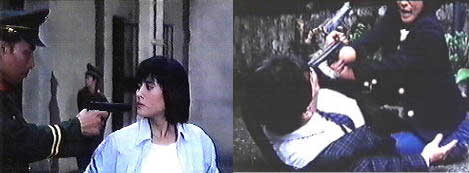
After being framed for drug smuggling and imprisoned in Mainland China, Yukari’s character faces a death sentence after an escape attempt. She is befriended in prison by Clare Wai’s character, and a mission to rescue her is launched from HK. Although the team initially succeeds by impersonating Mainland police, the escape plan misfires and they must flee on foot to the border, fighting a series of battles with the pursuing militia. The team members are killed one by one. After fighting their way through the border in action almost worthy of a war movie, Yukari and Max Mok survive long enough to exact revenge on the men who betrayed her back in HK. At one point Yukari’s character knocks one of these men down, pins him with her leg, and shoots him point blank in the face. The action, while brutal, is not gratuitous, and this film achieves considerable dramatic tension.
A 3, B 3, C 3, D 3, E 3, F3 (18).
Highly Recommended
(Movie Impact Ltd., Dir. Frankie Chan)
Frankie Chan and Max Mok star as a pair of car thieves stealing exotic cars. Their paths eventually cross with a drug smuggler played by Michiko Nishiwaki. Yukari plays an undercover police investigator who befriends Chan’s character and eventually arrests all of them. She has several well choreographed fight scenes. However, this movie is chiefly distinguished by the incredible final fight sequence that takes place, characteristically, in a warehouse. Frankie Chan’s set-piece directing works well, resulting in a fight that ranks among HK classics.

This single fight reportedly provided a major boost to Yukari’s career - almost making her a star. She can only be described as jaw-dropping, moving with incredible speed, agility and viciousness. She apparently worked hard to incorporate Hung Gar, blending her own very angular movements with the more fluid Chinese form. Jackie Chan reportedly helped choreograph this fight. It shows in characteristic visual humor, but is seasoned with Yukari’s ruthlessness. As she stabs Jeff Falcon’s character in the neck she displays a supercilious smirk, commenting as he dies “Weren’t you taught the longer the stronger?” She is ranged against a number of excellent gwailo opponents, some of whom later commented on her physical prowess.

It may take viewers unfamiliar with HK cinema a few moments to realize that Yukari is a woman. Her muscle tone, stance and toughness must be seen. Even though the rest of the film lags in places, particularly during the sub-plots, the ending is an enduring classic. Favorite line (Yukari): “When I pretended to be in love with him he talked even more dirty. You thought you really wooed me, eat turd!”
A 3, B 4, C 3, D 2.5, E 3, F 3 (18.5).
Highly Recommended
(Dir. Wong Chung Yam, aka Benny Wong, aka Simon Yun Ching)
The presence of more costume fetishism and some outrageously graphic symbolism in this action comedy is better understood after recognizing that the Director, Benny Wong (aka Benny C. Y. Wong) is actually Simon Yun Ching. In this movie he appears to rehearse the symbolic devices he would later employ so successfully in “Dreaming The Reality” and “Angel Terminators II.” The plot is incidental. A bumbling P.I. finds himself in possession of a large sum of drug money. He is hospitalized after a fight. His partner Max Mok, together with Yukari and Wai Ying-Hung (Clare Wai) fight off various attempts to retrieve it, without recognizing why they are being attacked. Eventually the gang kidnaps Yukari, holding her as a hostage to force return of the money.
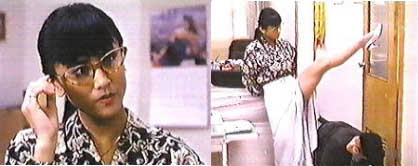
During the first half of the film Yukari is demurely attired in ‘50s-style blouse, flowing skirt, cat’s eyes spectacles and ponytail. She has several spectacular fights dressed like this, even wearing heels. When she poses with her entire leg exposed, before kicking a groveling bad guy, its not clear whether his frantic nodding represents begging for mercy or for more pain. At various points Yukari is also briefly presented fawning over her unattractive out-of-shape male boss, emerging from the bathroom, rummaging in the back of a laden garbage truck - only to find pornography, being kidnapped and tied up, and tormented by rats and reptiles while being videotaped by a sadist. At the other extreme she (twice) accidentally kicks her boss/partner in the genitals during a fight causing permanent priapism, emerges from a bathroom attired as a butch - with a remarkable resemblance to her later character in “Dreaming” - then sexually assaults an unwanted female guest, and (together with Clare Wai) simply trashes the arrogant male opposition - kicking a guy through a glass door and squirting a tube of glue up another’s nose. During the final fight she also spears one guy with a wooden stake. Uncharacteristic outtakes, as the final credits roll, show Yukari in command of the action, as well as exchanging pretty painful full-contact blows during the filming.
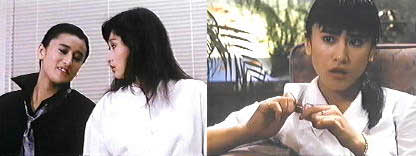
In other words, this film is all about power and control versus submission and humiliation. In the guise of an action comedy it superficially seems harmless enough, but the message still gets through. Can the symbolism be any clearer? These elements are exclusively associated with Yukari’s character, indicating that the director clearly understood her potential to traverse both extremes. The camera leers and peers closely, intimately. We can observe beads of sweat, pimples, buck teeth, insect bites. Skirts fly. Yukari has five separate fight sequences, all excellent and some stellar. The action becomes progressively rougher, and the fetishistic elements are gradually stripped away. By the time the final fight scenes are played out, it’s as good as any of Yukari’s action. Few other women can deliver front punches with comparable power - complete with bloody knuckles. This movie clearly shows how she could serve as inspiration for women’s boxing! As usual, Clare Wai is excellent, with some great fight sequences. The combination of these two in this production offers some of the best female kung-fu/karate action of the genre.
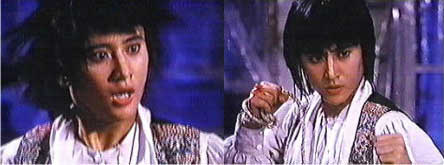
A 3.5, B 4, C 3.5, D 3.5, E 4, F 2 (20.5).
Highly Recommended
(New Treasurer Films/Top Approach Film Co.)
Yukari has never looked better (or changed outfits as often) as in this police drama in which she is the principal star. Despite a very low budget and apparently being shot directly on videotape, the camera work and directing are really quite promising. Editing is crisp and the score is decent. For a change there are plenty of lengthy close-ups. Yukari sports the very short hair and masculine look that suit her so well. She plays an HK cop who tends to slap suspects around. By chance she meets a man and forms a relationship. In the meantime her sister has been framed for drug smuggling and arrested. Yukari discovers there is a romantic triangle. During a painfully awkward attempt at a love scene, Yukari is saved by an incoming fax message. She eventually discovers that the object of her affection is actually a drug dealer. This film is essentially a drama, with minimal action scenes. However, Yukari is very watchable!
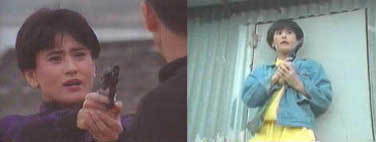
A 4, B 2, C 2.5, D 3, E 1.5, F 2 (15).
Recommended
(Dir. Leung Lee)
Yukari plays a shape-shifting supernatural
cat queen who has spent 500 years locked in combat with a wolf. This
figure appears to represent rape symbolism. On two occasions the
“wolf” term is explicitly paired with two separate sexual assailants.
Also, when the wolf spirit attacks her he vows to “marry” her so as to
“release” his “hatred.” When she breaks off his canine teeth, he
returns using both as hand-held weapons grown to phallic proportions -
attempting to stab her. Although Yukari defeats him, she is injured
and rescued (in her human form) by a kind-hearted man. Yukari then
transforms into a cat, and lives with him. In the meantime, his girl
friend has witnessed a murder. She is then pursued by the perpetrator
- a nightclub owner and rapist. Although the couple flees to her
father’s home, the gang tracks them down and takes her infant nephew hostage.
Although Yukari (in her human form) secretly recovers the child, as well
as saving the couple on other occasions along the way, the young woman
is eventually the target of abduction and sexual assault. Yukari
fights her way through the gang to rescue her and finally kill the “wolf,”
before returning to her unappreciated, unacknowledged cat form.

Her five fights are brief but quite well directed, although this Taiwanese movie does not have the crisp choreography of the best HK productions. Better camera position and editing would also have improved the fight sequences. This film is perhaps of greatest interest for its symbolism.
A 2.5, B 2.5, C 3, D 2, E 2, F 3 (15).
Recommended
(T&M International Film Co. Ltd., Dir. Simon Yun Ching)
Forget any criticism you may have heard concerning the lengthy kickboxing scenes. This movie is a subtle, well crafted tale of two couples, and is perhaps the best “Girls With Guns” movie made. Si Lan Fa (Sibelle Hu) is a hard-living former HK cop who now runs the Cabin Pub (“Si Chi Bar”) in Bangkok together with Rocky. Rocky is a young man who aspires to be a Thai boxer. Despite Lan’s efforts to steer him in safer and more productive directions, her own drinking and gambling work against her. He is drawn into the fight game - as are we, during his bouts. When Rocky is injured in a traffic accident and tries to get out of his contract, his boss and fight promoter Mr. Chin puts increasing pressure on Rocky and Lan - eventually sending his men to shoot up their place of business.

As this sympathetic sequence of essentially normal people struggling with their youthful dreams or more adult addictions unfolds, a second thread is interwoven. Moon Lee and Yukari Oshima have been trained from childhood, together with a boy aptly nick-named “Scorpion,” as contract killers. Despite using the Chinese familial form of address “Sister,” they are not actually siblings, and owe sole loyalty to Eddy Ko (Ko, Eddy Hung) who controls them. While Rocky and Lan lead essentially normal lives, Yukari and “Silver Fox” (Moon Lee) live completely outside the law. Their moral code is based on unquestioning obedience. As with Rocky and Lan, this equilibrium is upset by internal forces they cannot predict or control. After inadvertently killing a van load of school children during an ambush, Silver Fox begins experiencing posttraumatic stress, complete with flashbacks and nightmares. When the women are sent on assignment to Bangkok to kill a courier and retrieve evidence that incriminates Ko’s character, Silver Fox continues killing without compunction, while Yukari’s character seemingly remains unaffected by it all.

Although they complete the hit, the women are nearly caught by the Thai military. During her escape, Silver Fox receives a head injury and enters a dissociative state. She eventually wanders into the Cabin Pub, where Lan and Rocky care for her. Since she has amnesia they assume she was a refugee, and give her a new name (“Gold”) and put her to work in the bar. Yukari desperately searches for Silver Fox (Yukari - “There’s no reason for her not coming to me”), with the ruthless assistance of Scorpion - killing a number of people without compunction or a trace of emotion. In the meantime, Gold/Silver Fox has begun to regain her faculties. When Chin’s men attack the bar, she suddenly reverts to her previous state and kills them all. This attracts Yukari’s attention, and she finally locates Silver Fox.
While she is in hiding, Rocky shyly announces his love for Gold. But it’s too late. She is not the same person. When Yukari arrives, it is to kill Silver Fox on the orders of Ko. After an emotionally intense confrontation she cannot do it. Silver Fox wants out of the killing business, and Yukari cannot kill her as ordered. Knowing the consequences, she only wounds Silver Fox, and is herself killed on the spot by Scorpion. Rocky also gives his life to save Silver Fox. Silver Fox and Lan then spring a trap for Ko and Scorpion, killing all of them except Ko in a bloody shoot-out. Ko is left to suffer the humiliation of arrest. Although he begs for death, they won’t oblige.
This film is very well directed, with good production values, lighting and camera work. All the principal cast members provide some of the best performances of their careers. Moon Lee and Yukari appear stunningly beautiful. Their character development is well paced, and both have opportunities to display true acting talent. Yukari’s capacity to act without even speaking - expressed via nuances of body posture and facial expression - is particularly impressive, as is Moon Lee’s uncharacteristic depiction of personal torment and suffering. The psychological sophistication and subtle subtext of this film place it well above the majority of HK action movies, and convincingly demonstrate that deficits in directing, rather than lack of acting talent, compromise so many other titles. Favorite line (Yukari, gesturing to a nearby couple on a date): “this game doesn’t suit us.”
A 2.5, B 4, C 4, D 4, E 4, F 4 (22.5).
Highly Recommended
(High Grow Films Distributors, Dir. Fan Tsui Fen)
Yukari plays the daughter of an HK nightclub boss whose organization is taken over by a Japanese rival. When her father is killed, she and her bodyguard - played by Mark Cheng - take revenge. Highlights of this otherwise fairly routine actioner include Yukari’s confrontation with a homicidal Dick Wei in a tiny apartment. He wields a knife that can pierce a door. Yukari also deals with a motorcycle-born assailant who unwisely tailgates her by jamming on her brakes. She has an opportunity to act in this film, as well as several solid fight scenes. Favorite line (Yukari’s “aunt”): “As you’re so rude, no boys will like you.”

A 3, B 3, C 2, D 2, E 2.5, F 2 (14.5).
Recommended
(Golden Sun Light Production Co. Ltd., Dir. Shum Wai)
A citizen vigilante who impersonates a cop is killed while attempting to prevent a jewel robbery by a gang of transvestites he mistakes for women. His spirit haunts the senior police officer investigating the crime, in an attempt to persuade him to assign a male investigator instead of Lin Lin (Yukari) to the case. He makes sexist statements such as “How can I be killed by women? I am a man!” and “How can women work” or “All women are useless.”
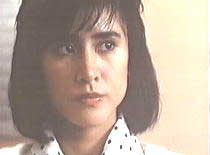
This bizarre story involves a scene in which the spirit extends an elongated tongue across Lin Lin’s desk, flicking it provocatively until she slaps a book on it. The ghost also prompts another male police officer to make insultingly sexist remarks to Lin Lin - who kicks him through the door while swearing at him in English! The ghost then persuades Lin Lin’s superior (her fiancé) that her undercover meeting to buy the stolen diamonds is actually an affair. Lin Lin takes out the criminals in classic Yukari style, finally punching out her suspicious fiancé as well.

This movie veers wildly between spirit and ghost comedy, and brutal violence. The action scenes are actually very well done. Yukari’s two fight scenes are reminiscent of “A Book of Heroes” in pace and intensity, featuring spectacular kip-ups and flips seamlessly blended with wonderful kicks. Skip the sexist and homophobic humor. This movie is worth watching for Yukari’s fights alone. Watch for cameo appearances by Philip Ko and Eddy Ko.
A 2.5, B 4, C 2, D 2.5, E 3, F 1 (15).
Fight Scenes
|
|
|
|